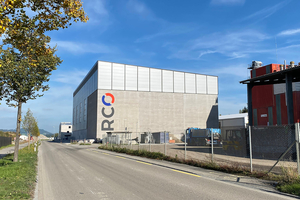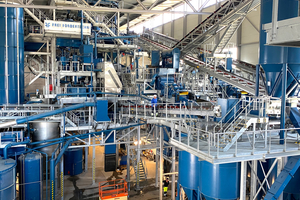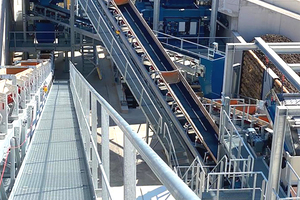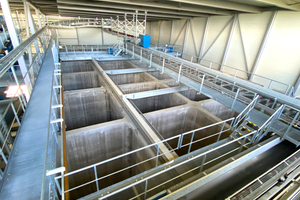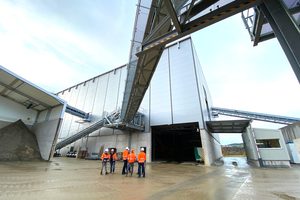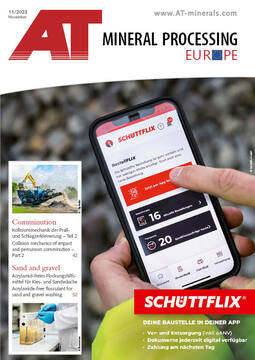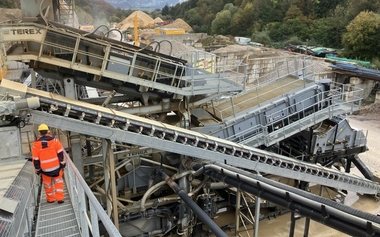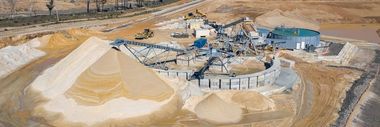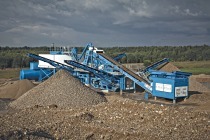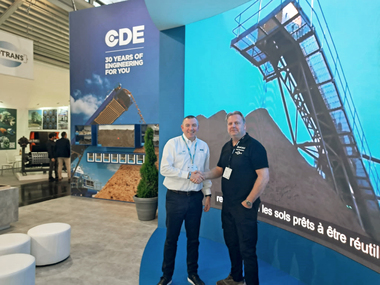High-quality building materials thanks to state-of-the-art building materials recycling plant
A new building materials recycling and soil washing plant has been built in Niederstetten near Wil SG. The inauguration and opening of the innovative, flexible and state-of-the-art building materials recycling plant took place on 11 May 2023. RCO was founded in 2018 by the two companies Holcim Kies und Beton AG and Zürcher Kies und Transport AG. With the fully automated plant, RCO now processes contaminated construction waste and returns it to the building materials cycle as high-quality materials.
Turnkey recycling plant
Frei Fördertechnik AG from Rubigen took over the planning, engineering in close cooperation with RCO, fabrication, assembly, E-MSRL control and commissioning of the building materials recycling plant as a complete turnkey system. The scope of supply also included the delivery of spare and wear parts. The new plant replaces the mobile plant that has been in operation for almost two decades.
The state-of-the-art process technology sorts, classifies and doses the various material components. “In addition, pollutants and foreign substances can be removed efficiently, which ensures a significantly improved quality of the products,” explains Stefan Eberhard, Delegate of the Board of Directors. The building materials produced in this way are of high quality and conform to standards. RCO processes around 200 000 t of construction waste and contaminated excavated material per year. With the recyclable materials recovered from this, more than 500 single-family homes are built each year from sustainable building materials.
State-of-the-art technologies are unique
“The declared input material such as concrete demolition waste, mixed demolition waste, loamy or gravelly excavated material, as well as lightly and heavily loaded ballast from track dismantling are delivered by truck or by rail. Then the batches of between 1000 and 10 000 t are washed,” explains Hans Brugger, Operations Manager at RCO. With two feeding lines, the materials can be optimally sorted and fed into the process. The classification and dosing of the individual material components are unique for a plant with these possibilities and guarantee a customer-specific delivery of the building material products.
The core elements of the fully automated process technology are the material feed and two innovative double roll crushers in the primary crushing plant. Here, the material is crushed down to less than 63 mm. The material then enters the material washing system. In the material wash, the gravel is freed from sand and silt. In the subsequent defraction, foreign matter (metal, wood, plastic, etc.) is removed from the gravel. The gravel is divided into 4/8, 8/16, 16/32 and 32/63 fractions using screening machines. The 0/4 sand is cleaned in the sand processing section. All areas are connected by conveyor belts. Material storage and dosing of the gravel and sand fractions takes place in a silo system with 32 material silos, which are fed by a transfer trolley. Rainwater is fed in for the required washing water and treated in a cycle. The sludge water is clarified by means of inclined lamella clarifiers, the sludge is dewatered in a filter press and the clean water is returned to the process. The output material: concrete, mixed demolition waste and excavated material go back into the concrete cycle in the form of concrete. The ballast goes back into railway construction.
Sustainable construction is becoming increasingly important in order to effectively meet current challenges such as climate protection and the scarcity of resources. Built-in material is reused instead of disposed of after a building has been demolished. With their joint know-how, the two companies Holcim and Zürcher want to drive innovation in building materials recycling, close material cycles even more consistently and serve the eastern Swiss market with high-quality building materials.
Frei Fördertechnik AG scope of delivery – complete system from a single source
• Consulting, engineering, planning, implementation, assembly and commissioning
• Process engineering for a turnkey plant
• Material feed and primary crushing
• Conveyor belts
• Material washing
• Clarification towers
• Water and sludge treatment
• Sand processing
• Removal of impurities/classification
• Pipeline construction for treatment plant
• Steel construction (without building)
• Control system and software
• Spare and wear parts

